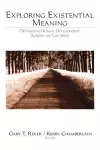
Exploring Existential Meaning
2 contributors - Paperback
£84.00
Gary T. Reker, Ph.D. was born in Hamm, West Germany in 1942. He obtained his B.A. (1965) from McMaster University and his M.A.Sc. (1970) and Ph.D. (1973) from the University of Waterloo. He has been at Trent University since 1972 and retired as Professor Emeritus in Psychology in 2008. He is married to Dorothy and they have three grown daughters and six grandchildren. As a life-span developmental psychologist, his teaching and research interests have focussed on the aging process, specifically on the role of personal meaning in life, optimism, death attitudes, resilience and creative coping in promoting successful aging. He has conceptualized and constructed numerous measuring instruments, has published numerous articles in peer reviewed journals, authored several book chapters, and has edited (with Kerry Chamberlain) a book entitled, "Existential meaning: Optimizing human development across the life span" (Sage, 2000). In 1981 and again in 1986, he was a Fellow of the Andrew Norman Institute for Advanced Studies in Gerontology and Geriatrics at the University of Southern California. In 1999, he was the Visiting Chair in Gerontology at St. Thomas University, Fredericton, New Brunswick. In 2007, he returned to the University of Southern California as a Visiting Scholar. He is actively involved in the Gerontological Society of America, the International Network on Personal Meaning, and the International Institute for Reminiscence and Life Review. Kerry Chamberlain is Professor of Social and Health Psychology at Massey University in Auckland, New Zealand. He is coeditor (with Michael Murray) of Qualitative Health Psychology: Theories and Methods (SAGE), coauthor (with Antonia Lyons) of Health Psychology: A Critical Introduction (Cambridge), and series editor (with Antonia Lyons) for Critical Approaches to Health (Routledge). He serves on the editorial boards of several journals and has published widely on health issues and qualitative research. His current research interests are in poverty, health and illness, medicalisation, food, and the mundane, and innovative methods for qualitative research.